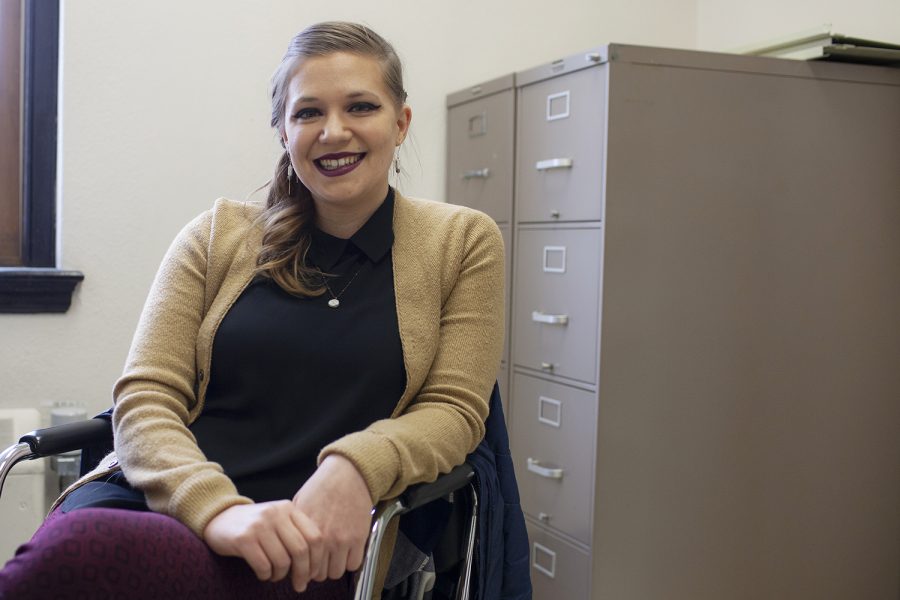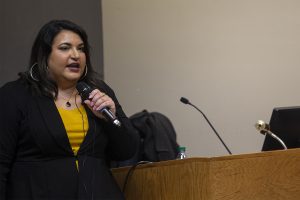UI grad student takes home first place for humanities-based Three Minute Thesis competition
UI graduate student Christie Vogler wins the Obermann Center’s first humanities-based Three-Minute Thesis competition with her research on gender archeology, which uncovers the unknown roles of women in Ancient Rome.
University of Iowa PhD candidate in archaeology Christie Vogler poses for a portrait on Wednesday, Feb. 5, 2020 in her office inside of Macbride Hall. Vogler’s research focuses on possible means of authority for affluent women living in the Gangivecchio, Sicily, region during the 1st-3rd century CE.
February 10, 2020
University of Iowa graduate student Christie Vogler’s recreated dissertation thesis on gender archeology and gender studies in Ancient Rome won first place in the Obermann Center for Advanced Studies’ first-ever, humanities-based Three Minutes Thesis competition.
Obermann Center Associate Director Jennifer New said in an email to The Daily Iowan that the Graduate College has sponsored the campus-wide competition for a number of years, but this past fall marked the first humanities-based competition.
“Although it’s grown in popularity, there has been a relatively low participation rate by students in the humanities,” she said. “Because the Obermann Center supports the humanities and also works with graduate students via the Obermann Graduate Institute on Engagement and the Academy … we thought we’d offer a humanities-focused 3MT.”
Four humanities competitors went on to the campus-wide competition and two progressed to the finals, New said.
Vogler’s initial research pursued indications of a nearby cult site to the Greek goddesses Persephone and Demeter. She hoped to find evidence of how the site may have been a touchstone for the Greek, Roman, and indigenous groups’ cultures to interact.
To her disappointment, Vogler said, the uncovered artifacts from the site failed to date far enough into the Greek colonization period.
Vogler’s adviser, UI Associate Professor Glenn Storey, said the dig began to come across a material record that included women’s jewelry, hairpins, and cosmetic applicators in 2017. Many of their colleagues suspected that the site had once been a brothel due to the high volume of female-oriented objects, but Vogler saw the evidence pointing in a different direction.
He described a lamp scene depicting a scene of childbirth in which a conical object comes out from between a woman’s legs.
RELATED: UI uses $1.6 million in grants to focus on humanities research
“[Now] I am completely convinced that it is a scene of childbirth, because if you look closely where the break is, it looks like it’s the swaddling of a child,” he said.
Their changed view allowed them to look further into the female orientation of the site and connected the recently discovered objects with medical tools that they had uncovered in 2012 and 2015, he said.
“[I] had to rethink the space entirely because everything was reading so female and then, all of a sudden, [we identified that we] had medical tools present,” Vogler said. “[I thought] if we’re seeing all of these artifacts nearby that are usually gendered more female, then maybe we should start looking at the possibility of a female doctor operating in this space.”
From this, Vogler said she created two hypotheses: the first predicted that a wealthy woman, to whom the artifacts belonged to, took up the medical occupation after a time of warfare where many men died; the second was that the wealthy woman ran the villa as well as a medical practice where a female slave worked as a doctor to earn her freedom.
These two possibilities from her findings sparked Vogler’s interest in meshing archeology with gender studies to recreate her dissertation, she said.
Upon returning to the UI from Sicily, Vogler learned that the Obermann Center was hosting a Three-Minute Thesis competition for the humanities and decided to register.
“Being at Three-Minute Thesis and seeing all the research that actually happens here is a really cool experience because normally departments are kind of their own little things and you aren’t really aware of what’s going on elsewhere,” Vogler said. “[After winning, I felt] a little disbelief because I was up against some stiff competition, but [at the same time] I had worked so hard, so it felt so worthwhile to know that my hard work paid off in the end.”






